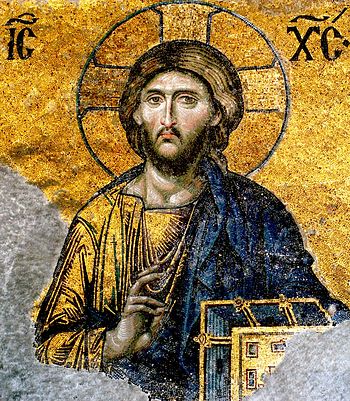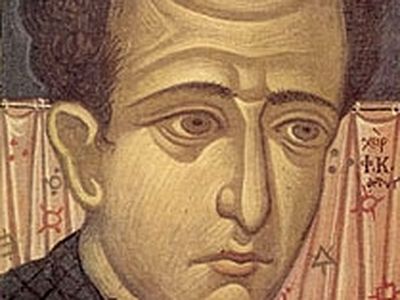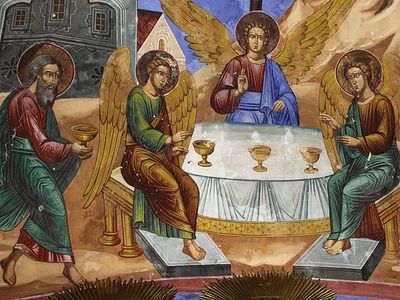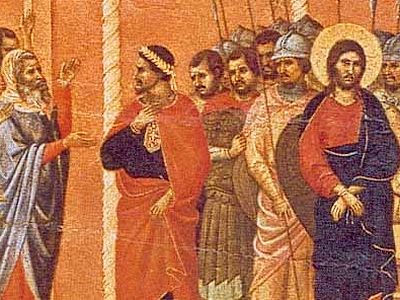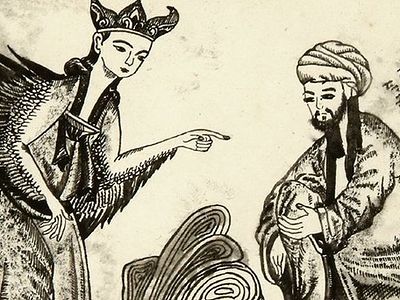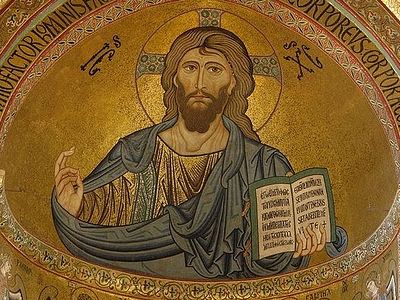Introduction
"A Stone of stumbling and
a Rock of offense"
Faith in the divinity of Jesus Christ is the foundation of our religious convictions. This faith gives us spiritual strength, in-spires us to do good, and gives direction to our efforts and to our expectations. Without it Christianity loses its inspirational power and is reduced to a collection of ancient myths and unfulfilled promises.
Though of great importance, Christ’s divinity is not self-evident. There are even some passages in the Gospels which seem to contradict it. Therefore, those who dispute the divinity of Christ have no difficulty in finding biblical texts which supposedly support their opinion that Jesus Christ was either a man or some incarnate spiritual creature and therefore cannot be called God in the true sense of the word. At the same time opponents of the faith of the divinity of Christ point to the absence of biblical texts in which Jesus called Himself God, and from this they draw the incorrect conclusion that this title was given to Him later.
Contradictory opinions concerning the nature of Christ began to spring up from the very first days of Christianity. Quite serious disputes and disturbances were caused in the fourth century A.D. by the Arian heresy, which taught that Jesus Christ was only a creature, although the most perfect and powerful one ever created. This heresy was thoroughly discussed by the First Ecumenical Council which was held in the city of Nicaea in 325. The Fathers of this Council rejected arianism and composed a Symbol of Faith, or Creed, in which, using very precise statements, they expressed the true teaching concerning Jesus Christ. This Creed has been used by the Eastern Orthodox Church to this very day.
In our time the sect of Jehovah’s Witnesses has resurrected the defeated Arian heresy from the dust of history. Their variation of it teaches that Jesus Christ is the incarnation of a spirit-son or an angel-like creature (perhaps of the Archangel Michael). The danger posed by the sect of Jehovah’s Witnesses comes from the fact that they possess seemingly unlimited financial reserves and thus flood the world with their literature and their preachers. A particularly aggressive missionary work is being carried on in Russia, where they have caught thousands of trusting people in the nets of their cult.
Orthodox people in Russia are in particular danger from these sectarian preachers because, not being use to the vagaries of living in a pluralistic society, they do not know how to defend their faith, and the majority of them are not very familiar with the Sacred Scriptures. On the other hand, the sectarian preachers are well versed in the texts that are useful to them, so that they can glibly overwhelm with quotations that suit their purpose.
The Scriptures on Jesus
Although the Holy Spirit scriptures repeatedly call Jesus Christ the Son of God, those who would discredit His divinity cite the fact that the Scriptures use the term "sons of God" not only to refer to Jesus Christ, but also to angels and people. In order to clarify this question, we should remember that when referring to people or angels as sons of God, the Holy Scriptures always use the plural form, and never the singular. This makes it evident that they are "sons" not by nature but by the grace of adoption. (Otherwise, for example, the designation of the ungodly as "sons of the Devil" would lead to the absurd conclusion that they have a different origin than the faithful). The Holy Scriptures use the singular form of the Son of God only when speaking of Jesus Christ. It is only to Him that the Holy Scriptures adds clarifying terms such as the Only Begotten, Beloved Son, Son of the Living God, True Son — all of which unambiguously indicate that, unlike us , He is the Son in the true sense of the word and by His divine nature. That is why the Mormons grossly err by claiming that Jesus Christ had other god-brothers like Lucifer (Satan!) and others. The Holy Scriptures clearly distinguish between the Son and the sons: the first is begotten; all the others were created.
At the very onset of Jesus Christ’s preaching, God the Father testified about Him saying, "This is My beloved Son in whom I am well pleased" (Matt. 3:17) Later, on Mount Tabor, the Father repeated these words adding: "Hear ye Him" (Matt. 17:5). This commands us to accept every word of Christ as complete and infallible truth.
But how can we respond to those who deny Christ’s divinity, when He Himself said: "My Father is greater than I … Of that day and of that hour (the end of the world) knoweth no man — no, not the angels who are in Heaven, neither the Son, but only the Father… The Son can do nothing of Himself , but what He seeth the Father do… My soul is exceedingly sorrowful, unto to death … not My will, but Thine be done" (John 14:28; Mark 13:32; John 5:19; Mark 14:34; Luke 22:42). Besides, if Jesus Christ truly regarded Himself as God, then why did He not announce this clearly and unambiguously? By doing so, He would have dispelled all doubts about Himself.
The purpose of this article is to help the reader deal with these questions and to give him the necessary information to defend his faith in the divinity of Christ. In order to understand why Our Lord Jesus Christ did not announce publicly His divinity, let us mentally transport ourselves to the time of Jesus.
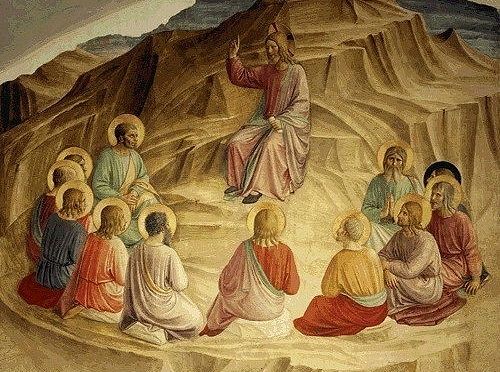 Fra Angelico. The Sermon on the Mount, fresco 1436 - 1443, Museo di San Marco, Florence
Fra Angelico. The Sermon on the Mount, fresco 1436 - 1443, Museo di San Marco, Florence
Imagine how people in the time of Jesus would have reacted to the words of a man who walked around declaring, "I am God!" Undoubtedly the crowd would have ridiculed Him as being out of His mind, while the zealots of the Jewish religion would have jumped at the chance to declare Him a blasphemer and demanded his execution. Only the pagans, who acknowledged many gods, might have accepted such a claim more seriously than the Jews, understanding it of course in terms of their superstitions. (Recall the reaction of the pagans to the miracles of the Apostle Paul as they were ready to declare him one of their gods and offer sacrifices to him, Acts 14:11). In our time people would turn away with scorn from any preacher who declared himself to be God. In any case, a direct declaration by the Savior regarding His divinity would not have had the desired result.
In fact, the Son of God did not come into our world to amaze His contemporaries with His omnipotence or to subject them to His divine power, but rather to incite them to righteousness. People had become so alienated from spiritual things and so morally corrupt that they were unfit to understand the truth of the divinity of Christ correctly. Let us recall from the Gospels how difficult it was for Christ to preach among the Jews and how much mockery He had to endure from the evil-minded scribes who strived to distort the meaning of His words and to prevent simple people from believing in Him. Therefore, the first thing that our Lord Jesus Christ had to do was to convince people to turn to God in repentance, reject their own religious prejudices, and sow in themselves the seeds of the true faith. In order to accomplish this, it was necessary to inspire them toward a righteous way of life, teach them to forgive, have compassion and love one another.
Such a deep spiritual shift in society could not have been accomplished by either threats or miracles. In fact, the manifestations of Christ’s divine nature, brought about by His performing miracles, stirred up in the Jewish people unhealthy ideas about the coming of a glorious and mighty messianic kingdom on earth, in which they would rule over other nations. For this reason they were forbidden by our Lord to talk about the miracles He performed.
In order to accomplish the spiritual renewal of men and to make them receptive to the true faith, Christ chose to use gentle and inspiring words and His personal example. Out of compassion for a perishing human race, He undertook to share their poverty, burdens and sorrows. In order to heal their moral ulcers, He took upon Himself their sins and washed them away with His precious Blood on the Cross. The saving of the sinful human race, from the moment of Christ’s incarnation to His suffering on the Cross, was a work of extreme voluntary self-abasement. In the words of the Apostle Paul, "(Christ) being in the form of God, thought it not robbery to be equal with God, but made Himself of no reputation, and took upon him the form of a servant"(Philippians 2:6-7).
This voluntary self-abasement of the Messiah is thus described by the prophet Isaiah: "He hath no form nor comeliness, and when we shall see Him, there is no beauty that we should desire Him. He is despised and rejected of men, a Man of sorrows and acquainted with grief … and we esteemed Him not. Surely He hath borne our griefs and carried our sorrows; yet we esteemed Him stricken, smitten of God, and afflicted. But He was wounded for our transgressions; He was bruised for our iniquities. The chastisement of our peace was upon Him, and with His stripes we are healed. All we like sheep have gone astray; we have turned everyone to his own way; and the Lord hath laid on Him the iniquity of us all. He was oppressed, and He was afflicted, yet He opened not His mouth … He was taken from prison and from judgment; and who shall declare His generation?" (Isaiah 53:2-8). With these concluding words the prophet was addressing the consciences of those who were to reject their Saviour, as if saying to them: You turn away in contempt from Jesus as He is mocked and beaten, but understand this, it is because of you sinners that He suffers so grievously. Contemplate His spiritual beauty, and maybe then you will be able to comprehend that He came to you from heaven.
While voluntarily abasing Himself for the sake of our salvation, Christ nevertheless gradually revealed the mystery of His oneness with God the Father to those who were capable of rising above the crude ideas of their contemporaries. Thus, for instance, He said to the Jews: "I and My Father are one … He that hath seen Me hath seen the Father … I am in the Father and the Father in Me … all Mine are Thine, and Thine are Mine … We will come unto him and make our abode with him" (John 10:30, 14:9, 14:10, 17:10 and 14:23). These and other similar expressions all indicate His divine nature. In addition, Christ gradually revealed those characteristics of His which no one but God can possess. For instance He referred to Himself as the Creator when He said: "My Father worketh hither to, and I work " (John 5:17). It is significant that the Jews hearing these words wanted to stone Christ as a blasphemer, "because He not only had broken the Sabbath, but said also that God was His Father, making Himself equal with God" (John 5:18). By not correcting their interpretation of His words, the Lord confirmed that they understood Him properly.
At other times, the Lord Jesus Christ referred to Himself as being eternal. For instance when the Jews asked Him "who art Thou?", Jesus replied "Even the same that I said unto you from the beginning" (John 8:25). Shortly after this He added: "Verily, verily I say to you, before Abraham was, I AM" (John 8:58). Here it must be noted that Jesus had not said "I was," as would have been grammatically correct in the context, but rather used the present tense "I am," or more exactly, "I am He who is." The deep meaning of these words becomes clear when one considers the Hebrew original meaning. When Moses asked God’s name at the burning bush, the Lord answered: "I am He who is" (YHWH). The very name "He who is" (YHWH) indicates the distinguishing characteristic of God. He is the One who always exists; He is the Eternal One. In referring to Himself as "He who is" (YHWH), Jesus Christ used the Hebrew name for God. It should be remembered that the name YHWH was held in such esteem by the Jews that they used it only on the most important and solemn occasions, while in ordinary speech they used the names Lord, Creator, Most High, the Blessed One, and so forth.
After His resurrection from the dead, Christ again referred to Himself as eternal: "‘I Am the Alpha and the Omega, the Beginning and the End,’ saith the Lord who is and who was and who is to come, the Almighty" (Rev. 1:8). On other occasions He called Himself omniscient (all-knowing), saying "As the Father knoweth Me, even so I know the Father" (John 10:15). Truly the essence of God is beyond the comprehension of finite beings. Only God can know His own nature perfectly. The Lord Jesus Christ also called Himself omnipresent when He said: "No man hath ascended up to heaven but He that came down from heaven, even the Son of Man who is in heaven … For where two or three are gathered together in My name, I am there in the midst of them" (John 3:13, Matt. 18:20). Here again Christ used the word is, meaning that not only was He or will He be in heaven, but He also abides there constantly.
Thus, since He shares with the Father all the divine attributes (creation, eternity, omniscience, omnipresence, etc.), Jesus Christ must be acknowledged by all as being equal to the Father as well. "All men should honor the Son, even as they honor the Father. He that honoreth not the Son honoreth not the Father who sent Him" (John 5:23). All that has been said here should convince an unprejudiced person of the unquestionable truth, that Jesus Christ is true God of true God, equal to the Father by nature.
Although Jesus Christ avoided calling Himself God directly so as not to incite the people unnecessarily, He did commend those who were able to lift themselves up to the acceptance of this truth. Thus, for example, when the Apostle Peter said in the presence of other Apostles: "Thou art the Christ, the Son of the living God," the Lord approved his confession of faith and added that Peter had come to such a conviction not simply by his own observations but by a special enlightenment from on high."Blessed art thou, Simon Bar-Jonah, for flesh and blood hath not revealed this to thee, but My Father who is in heaven" (Matt. 16:16-17). Similarly, when the Apostle Thomas, seeing the risen Savior, exclaimed: "My Lord and my God!" (John 20:28), Christ did not reject his addressing Him in this way but mildly reproached Thomas for being slow to believe. "Thomas, because thou hast seen Me (risen), thou hast believed. Blessed are those who have not seen and yet have believed" (John 20:29).
Finally let us remember that Christ was condemned to be crucified precisely because He formally admitted His divinity. Indeed, when the high priest Caiaphas asked Christ under oath: "Art Thou the Christ, the Son of the Blessed?", Christ responded: "It is as you said" (Mark 14:61, Matt. 26:64, Luke 22:70, John 19:7). Here Christ had responded using the prescribed form of an affirmative answer.
Now where did Caiaphas, many of the Jews, and even demons (!) get the idea that the Messiah was to be the Son of God? There is just one answer: from the Holy Scriptures of the Old Testament. Its intent was to prepare the Jews and the whole world for this belief. Indeed, King David, who lived a thousand years before the birth of Christ, referred to the Messiah as God in three of his psalms; Psalms 2, 54 (55), and 108 (109). The prophet Isaiah, who lived seven-hundred years before the birth of Christ, revealed this truth even more clearly. Foretelling the miracle of the Incarnation of the Son of God, Isaiah wrote: "Therefore the Lord Himself shall give you a sign: Behold, a virgin shall conceive and bear a Son, and shall call His name Immanuel" (which means "God with us," Isaiah 7:14). A little later the prophet reveals more precisely the character of the Son who would be born: "and His name shall be called Wonderful, Counselor, The Mighty God, The Everlasting Father, The Prince of Peace" (Isaiah 9:6). These titles cannot apply to anyone other than God. The prophet Micah also wrote of the eternal character of the Child who was to be born: "But thou Bethlehem Ephrathah, though thou be little among the thousands of Judah, yet out of thee shall come forth unto Me He that is to be ruler in Israel, whose goings forth have been from of old, from everlasting" (Micah 5:2).
The prophet Jeremiah, who lived about two hundred years after Isaiah’s time, calls the Messiah Lord: "The Lord is our righteousness" (Jer. 23:6, 33:16). Surmising Him to be the same Lord who called him to preach, Jeremiah’s disciple, the prophetBaruch, wrote these remarkable words about the Messiah: "This is our God, and no other can be found to compare to Him. He has found the complete way of knowledge and has given it to Jacob His servant, and to Israel His beloved. Afterward He was seen upon earth, and spoke with men" (Bar. 3:35-37). In other words God Himself would come to earth and live among men!
Given these definite indications in the Holy Scriptures, the more perceptive of the Jews could without hesitation recognize in Christ the true Son of God. (For further details on this subject see our booklet "The Old Testament on the Messiah"). It is noteworthy that even before the birth of Christ the righteous Elizabeth greeted the Virgin Mary who was expecting the Infant with these exultant words: "Blessed art thou among women, and blessed is the fruit of thy womb. And why is it granted to me that the mother of my Lord should come to me?" (Luke 1:42-43). Clearly, St. Elizabeth could have had no other Lord than Him whom she had served from her childhood. As St. Luke the Evangelist explains in these words, Elizabeth spoke them not on her own but through the inspiration of the Holy Spirit.
Having acquired a firm belief in the divinity of Christ, the Apostles planted this belief in Him throughout all nations. St. John the Theologian begins his Gospel with the revelation of the divine nature of Jesus Christ:
"In the beginning was the Word,
and the Word was with God,
and the Word was God.
The same was in the beginning with God.
All things were made by Him,
and without Him was not anything made that was made…
And the Word was made flesh,
and dwelt amongst us;
and we beheld His glory,
the glory as of the only Begotten of the Father,
full of grace and truth…
No man hath seen God at any time;
the only begotten Son,
who is in the bosom of the Father,
He hath declared Him"
(John 1:1-18).
The name Word bestowed upon the Son of God reveals better than any other name the mystery of the inner relationship between the First and Second Persons of the Holy Trinity, God the Father and God the Son. A thought and a word are distinct from each other in that the thought dwells in the mind, whereas the word is the expression of the thought; yet the two are inseparable. The thought does not exist without the word, nor does the word without the thought. A thought is like a word which is concealed within, and a word is that which gives expression to the thought. The thought takes the form of a word to convey the content of the thought to its hearers. Looked at in this way, the thought, being an independent principle, is the father of the word, and the word is the son of the thought. The word cannot exist prior to the thought, yet it does not originate from without; it comes from the thought and remains inseparable from the thought. Similarly, the Father, the supreme and all-encompassing Thought, produced from His bosom the Son, the Word, His first Interpreter and Herald (from St. Dionysius of Alexandria).
The Apostles spoke of the divinity of Christ with complete clarity: "And we know that the Son of God is come and hath given us understanding, that we may know Him that is true; and we are in Him that is true, even in His Son Jesus Christ" (1 John 5:20)… "of whom are the fathers, and from whom, according to the flesh, Christ came, who is over all, God blessed for ever" (Romans 9:5) … "Looking for that blessed hope and the glorious appearing of the great God and our Savior Jesus Christ" (Titus 2:13) … "Had they (the Jews) known (the wisdom of God), they would not have crucified the Lord of glory" (1 Cor. 2:8)… "For in Him (Christ) dwelleth all the fullness of the Godhead bodily" (Col. 2:9) … "And beyond controversy, great is the mystery of godliness" (1 Timothy 3:16). And in the first and second chapters of his epistle to the Hebrews, St. Paul the Apostle proves conclusively that the Son of God is not a creature but the Creator and that He is immeasurably superior to all beings created by Him. Angels are simply ministering spirits.
One Person, Two Natures
It must also be kept in mind that calling the Lord Jesus Christ God (Theos) in itself speaks of the fullness of divinity. From a logical, philosophical point of view, there cannot be a "second class" God, a God "lower in rank," a "limited" God. The attributes of the divine nature are not subject to conditionality or lessening. If He is God, then He is so completely, not partially.
Only if we assume a unity of Persons in God is it possible to join in one sentence the names of the Son and the Holy Spirit on an equal basis with the name of the Father: "Go ye therefore and teach all nations, baptizing them in the name of the Father, and of the Son, and of the Holy Spirit" (Matt. 28:19). "The grace of the Lord Jesus Christ, and the love of God, and the communion of the Holy Spirit be with you all" (2 Cor. 13:14). "For there are three that bear record in heaven: the Father, the Word, and the Holy Spirit; and these three are one" (1 John 5:7). Here the Apostle John emphasizes that the three are one — i.e., one in essence.
One must clearly differentiate between the understanding of person (hypostasis) and the understanding of nature or essence (ousia). The word person refers to personality, to the "I," and self-consciousness. The old cells of our organism die and are replaced constantly, but the self-consciousness remains throughout our whole life. The word "essence" speaks of nature and constitution. In God there is one nature but three Persons. Because of this, God the Father, God the Son and God the Spirit communicate with each other and decide together. Each Person of the Trinity retains His individual properties which distinguish Him from the other Persons. But all the Persons of the Trinity share the same divine nature. The Son has the same essence as His Father and the Holy Spirit. The teaching about the Holy Trinity reveals to us the inner and hidden life in God, which actually is inaccessible to our understanding, but at the same time is absolutely indispensable for the correct faith in Christ.
Jesus Christ has one Person — that of the Son of God, but two natures — divine and human. In His divine nature He is equal to the Father — eternal, omnipotent, omnipresent, etc.; in His assumed human nature He resembles us in every way: He grew, developed, suffered, rejoiced, vacillated in decisions, and so on. Christ’s human nature includes both the body and the soul. The difference is, that His human nature is totally free of sinful pollution. Since one and the same Christ is simultaneously God and man, the Holy Scriptures refer to Him sometimes as God and other times as a man. Even more so, sometimes human attributes are assigned to His divinity (1 Cor. 2:8), and divine attributes to His humanity. And there is no contradiction here, since all these attributes belong to the same Person. .
Taking into account the clear teaching of the Holy Scriptures regarding the divinity of the Lord Jesus Christ, the Fathers of the First Ecumenical Council decided to put a stop to all the misapplications of the term "Son of God" that lessened His divine dignity, and they therefore decreed that Christians believe: "In one Lord Jesus Christ, the Son of God, the only begotten, begotten of the Father before all ages. Light of Light, true God of true God; begotten, not made; of one essence with God the Father, by Whom all things were made."
The Arians heatedly objected to the Greek word meaning "one essence" (homousios) because it could not be explained in any other sense than the Orthodox one, meaning that Jesus Christ is recognized as true God, equal in everything to God the Father. For this reason the Fathers of the Council insisted that this particular word be used in the text of the Creed.
Conclusion
In summing up what has been said, we must remember that be-lief in the divinity of Christ cannot be planted in men’s hearts simply by scriptural citations or philosophical reasoning. What is needed is a willful acceptance of this God-revealed truth. It pleased God to uncover the hidden inclination of each person’s heart by their attitude toward Christ; "Thou hast hid these things from the wise and prudent, and hast revealed them unto babes" (Matt. 11:25). So in this regard, till the end of the world, things will be the same as they were two thousand years ago: for many people Christ will remain "A stone of stumbling and a rock of offense … that the thoughts of many hearts may be revealed" (1 Peter 2:8; Luke 2:35).
There are many, even among the Jews and Moslems, who would recognize Jesus Christ as a great person and even a prophet, but could never accept Him as true God. Precisely because of the personal effort required to accept the divinity of Jesus, faith in Him is rewarded with eternal life: "He that believeth and is baptized shall be saved; but he that believeth not shall be damned " (Mark 16:16).
This article does not attempt to "prove" that Christ is God because this truth requires faith. The purpose here is to help the Christian clarify his belief in our Lord and God and Saviour Jesus Christ; namely, that He is the Creator, and we are His creatures.
Two Ancient Prayers to Jesus
O Gentle Light
O Gentle Light of the holy glory of the immortal, heavenly, holy, blessed Father: Jesus Christ. Now that we have come to the setting of the sun, and behold the light of evening, we praise the Father, Son, and Holy Spirit: God! For meet it is at all times to worship Thee with voices of praise, O Son of God and Giver of life; therefore, all the world doth glorify Thee.
Only Begotten
Only Begotten Son and immortal Word of God, Who for our salvation didst will to be incarnate of the holy Theotokos and ever-Virgin Mary. Who without change didst become man and wast crucified. Who art one of the Holy Trinity, glorified with the Father and the Holy Spirit: O Christ, our God, trampling down death by death, save us!
